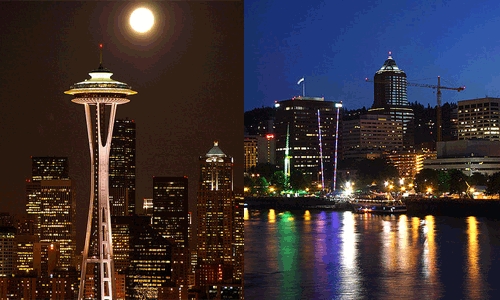 Does Portland have Needle envy?Images: subindie (Seattle, left) and Aaron Hockley (Portland)Seattle has a Portland-inferiority complex. Portland is hipper, friendlier, greener, less corporate, less formal, less hurried than its larger Northwest cousin, the regional mythology goes. You can pick up on stereotype from any number of young semi-professionals who settled for Seattle after failing to find work in Portland. Architect Dan Bertolet runs through the evidence for Portland’s environmental superiority: it has more streetcars, more bike boxes, more Energy Star buildings, more green roofs, a tougher climate action plan. It recently landed the U.S. headquarters for Danish wind-turbine maker Vestas. It’s not building a car-and-truck tunnel along its waterfront that would commit some $4 billion to auto-only transportation over the next century. But really, consensus says, it’s just a better vibe in Portland, despite Seattle’s sizable green ambitions. (The city council and a band of organizers want to make it North America’s first carbon neutral city.)
Does Portland have Needle envy?Images: subindie (Seattle, left) and Aaron Hockley (Portland)Seattle has a Portland-inferiority complex. Portland is hipper, friendlier, greener, less corporate, less formal, less hurried than its larger Northwest cousin, the regional mythology goes. You can pick up on stereotype from any number of young semi-professionals who settled for Seattle after failing to find work in Portland. Architect Dan Bertolet runs through the evidence for Portland’s environmental superiority: it has more streetcars, more bike boxes, more Energy Star buildings, more green roofs, a tougher climate action plan. It recently landed the U.S. headquarters for Danish wind-turbine maker Vestas. It’s not building a car-and-truck tunnel along its waterfront that would commit some $4 billion to auto-only transportation over the next century. But really, consensus says, it’s just a better vibe in Portland, despite Seattle’s sizable green ambitions. (The city council and a band of organizers want to make it North America’s first carbon neutral city.)
So the hopes were high for a bare-knuckled “who’s greener?” argument between Seattle Mayor Mike McGinn and Portland Mayor Sam Adams, who spoke together at a fundraiser for the “solutions journalism” nonprofit Worldchanging on Friday night. Alas, the mayors played nice. “I’m not going to play that game,” McGinn said beforehand, referring to the Seattle vs. Portland debate.
Instead, the two engaged in a discussion with Worldchanging editor and bright green urbanism evangelist Alex Steffen about how to run a city in a warming, recession-hobbled world. Steffen encouraged the two cities to think of themselves as global leaders. By mid-century, 70 percent of the world’s population will live in urban areas, he noted. It’s the duty of cities with top-flight universities, think tanks, and engineering firms — places like Seattle and Portland — to develop a model of livability the rest of the world can emulate.
But Adams and McGinn were hesitant to talk up their role as “global” mayors. McGinn said his major initiatives since taking office in January were about schools, employment, and transportation. He hasn’t launched anything called “Save the Planet,” he noted (though he gained most of his politicking experience at the local Sierra Club chapter). He may have learned the keep-it-local lesson from the man he defeated last fall, Greg Nickels, who started the U.S. Mayors Climate Protection Agreement. Voters resented what they perceived as a lack of attention to local issues (see “America’s greenest mayor, laid off and looking on“).
Adams said he was careful not to get caught up in “monument building,” reminding that Portland has 10.4 percent unemployment. “If you only seek to succeed in the future, you’ll never get there,” he said.
It made for some interesting if friendly pushback against Steffen, a global- and future-minded thinker (the event was called “Future City”). One of Steffen’s recurring themes is that we don’t just need sustainability eventually, we need it now. It needs to be done with a scope, scale, and speed far more aggressive than we’ve done so far. He made this point in a preview essay for the night:
We like to ride our bikes (or talk about it at least), buy our local organic food, mention the latest green building, donate to environmental groups, go hiking or kayaking on the weekends. Yet the simple fact is that our lives are profoundly unsustainable, both in the sense that if everyone on the planet lived like we do, our combined impact would be catastrophic, and in the sense that the cities we’ve built are extremely vulnerable to the climate chaos, resource disruptions and economic turbulence we know lies just ahead. Our cities as they are now cannot last, period.
The important projects, then, are the ones that address global problems and build local prosperity at once. Things like the money-saving retrofitting program Clean Energy Works Portland, which is expanding elsewhere in the state. And McGinn’s substantive Walk Bike Ride transportation plan, which the mayor has pushed to fund even during a budget crisis.
Even Steffen acknowledged that very few of us wake up thinking about the slums of Mumbai or melting ice caps. We think about getting kids to school and planning for dinner. Figuring out better, greener, affordable ways to take care of those everyday challenges seems to be the task for the green urbanism crowd, and for mayors who want to keep their jobs.



